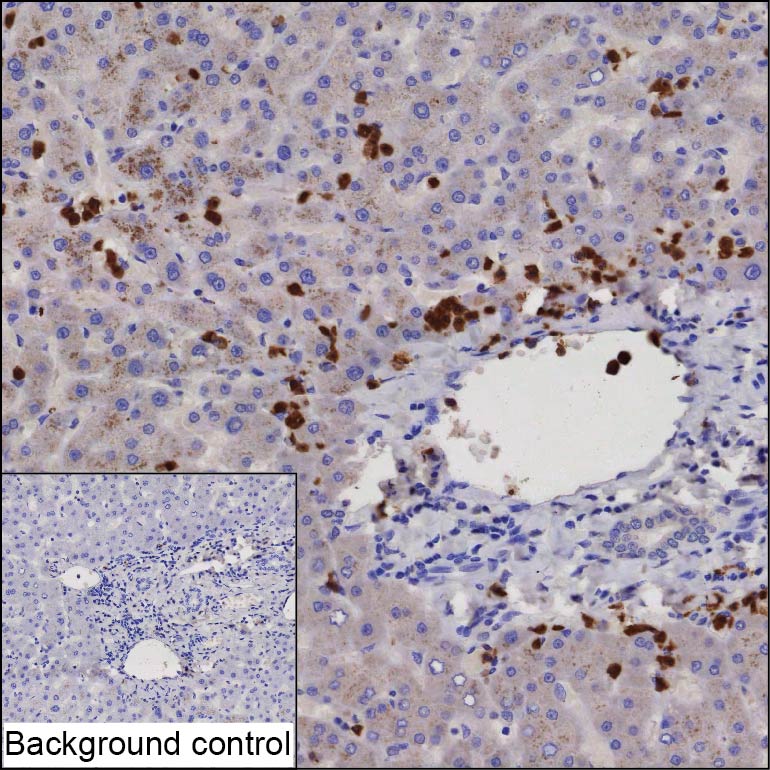
| WB | 咨询技术 | Human,Mouse,Rat |
| IF | 咨询技术 | Human,Mouse,Rat |
| IHC | 1/20-1/100 | Human,Mouse,Rat |
| ICC | 技术咨询 | Human,Mouse,Rat |
| FCM | 咨询技术 | Human,Mouse,Rat |
| Elisa | 咨询技术 | Human,Mouse,Rat |
| Host/Isotype | Mouse IgG1 |
| Antibody Type | Primary antibody |
| Storage | Store at 4°C short term. Aliquot and store at -20°C long term. Avoid freeze/thaw cycles. |
| Species Reactivity | Human |
| Immunogen | Purified recombinant fragment of human COPE |
| Formulation | Purified antibody in PBS with 0.05% sodium azide |
+ +
以下是关于COPE抗体的3篇代表性文献示例(注:文献信息为示例性概括,具体引用需核实原文):
---
1. **文献名称**:*"COPI complex subunit epsilon (COPE) regulates Golgi integrity and secretory trafficking"*
**作者**:Hara, Y., et al.
**摘要**:研究利用COPE抗体通过免疫荧光和Western blot分析,揭示了COPE蛋白在维持高尔基体结构和囊泡运输中的关键作用,敲低COPE导致分泌途径异常。
2. **文献名称**:*"Characterization of COPI coatomer complex components in cancer cell migration"*
**作者**:Zhao, L., et al.
**摘要**:通过COPE抗体检测多种癌细胞系中的蛋白表达水平,发现COPE表达升高与肿瘤迁移相关,提示其在癌症转移中的潜在调控机制。
3. **文献名称**:*"Structural and functional analysis of the COPI coatomer epsilon subunit"*
**作者**:Sahlender, D.A., et al.
**摘要**:结合COPE抗体的免疫沉淀实验和冷冻电镜技术,解析了COPE在COPI复合体中的结构定位及其与ARF1蛋白的相互作用机制。
---
如需具体文献,建议通过PubMed或Google Scholar以关键词“COPE antibody”“coatomer epsilon”检索近年研究。
COPE antibodies target components of the coat protein complex I (COPI), a key player in intracellular vesicular transport. Discovered in the early 1990s, COPI vesicles mediate retrograde trafficking from the Golgi apparatus to the endoplasmic reticulum (ER) and intra-Golgi recycling. The COPI complex comprises seven subunits (α-, β-, β’-, γ-, δ-, ε-, and ζ-COP), which assemble into a coatomer structure that facilitates cargo selection and vesicle budding. COPI’s function is closely linked to the ARF1 GTPase, which triggers coatomer recruitment to membranes.
Antibodies against COPE (ε-COP subunit) are widely used to study COPI dynamics, localization, and interactions in cellular trafficking pathways. They help visualize COPI-coated vesicles via immunofluorescence, detect protein expression levels in Western blotting, or immunoprecipitate COPI complexes for functional studies. Dysregulation of COPI-mediated transport is implicated in diseases like neurodegeneration, cancer, and lipid metabolism disorders, making these antibodies valuable tools for exploring pathological mechanisms. Researchers also utilize COPE antibodies to dissect the role of COPI in maintaining Golgi structure, ER homeostasis, and cargo sorting. Their application spans basic cell biology, drug discovery, and diagnostic research, underscoring their importance in understanding membrane trafficking networks.
×